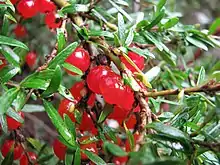Coprosma nitida
Coprosma nitida, the mountain currant or shining currant, is a shrub species endemic to south-east Australia. It is a shrub with small, glossy leaves, occasional spines on the end of its branchlets, and small bright red-orange fruits.
| Coprosma nitida | |
|---|---|
 | |
| Scientific classification | |
| Kingdom: | Plantae |
| Clade: | Tracheophytes |
| Clade: | Angiosperms |
| Clade: | Eudicots |
| Clade: | Asterids |
| Order: | Gentianales |
| Family: | Rubiaceae |
| Genus: | Coprosma |
| Species: | C. nitida |
| Binomial name | |
| Coprosma nitida | |
Description
Coprosma nitida is erect, densely branching shrub in the family Rubiaceae, growing between 1 and 2m high. Leaves are 5-15mm in length, narrow-ovate with a distinct midrib, glossy leaf surface, and entire leaf margin, arranged oppositely on short petioles.[2] The ends of its branchlets are often sharpened.[3] C. nitida is dioecious with single, terminal flowers. These are funnel-shaped, approximately 5mm in diameter, and pale green in colour. Flowering occurs spring through summer followed by red-orange fleshy drupe or ‘fruit’, round and 10mm long.[4]
Habitat & distribution
The genus Coprosma is found in Australia, New Zealand, the Hawaiian Islands, Borneo, Java, New Guinea, to the Juan Fernández Islands.[5] The species nitida is found exclusively in the south-eastern states Tasmania, some parts of Victoria and New South Wales. C. nitida most commonly occurs in subalpine woodlands between 400 and 1,000m above sea level, in well-drained soils.[4]
References
- "Coprosma nitida". Australian Plant Name Index (APNI), IBIS database. Centre for Plant Biodiversity Research, Australian Government.
- Jordan, Greg. "Coprosma nitida (Rubiaceae) 2:269". Key to Tasmanian Vascular Plants. Archived from the original on 2010-12-15.
- "Species information: Coprosma nitida". www.utas.edu.au. Retrieved 2019-12-09.
- "Flora of Victoria". vicflora.rbg.vic.gov.au. Retrieved 2019-12-09.
- Govaerts, R. et al.. Coprosma in World Checklist of Selected Plant Families. The Board of Trustees of the Royal Botanic Gardens, Kew. Published on the internet. Accessed: 10-12-19.